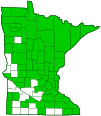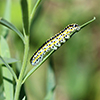Butter and eggs
(Linaria vulgaris)
Conservation • Weed • Description • Habitat • Ecology • Use • Distribution • Taxonomy
Conservation Status |
|||
| IUCN Red List | not listed |
||
| NatureServe | NNA - Not applicable SNA - Not applicable |
||
| Minnesota | not listed |
||
Weed Status |
|||
Butter and eggs is listed as an invasive terrestrial plant by the Minnesota Department of Natural Resources. However, it is not currently regulated in Minnesota. |
|||
Description
Butter and eggs, also called common toadflax and yellow toadflax, is an exotic, colorful weed. It is native to Europe and Asia. It was intentionally introduced and is now common in North America. The date of its introduction is uncertain, as original sources have different stories. One account suggests it was first introduced by a Welsh Quaker who came to Delaware with William Penn and then spread from colonial gardens. Another source mentions it was first introduced into the northeastern United States (New England) sometime before 1672. The proliferation of Linaria vulgaris in mid-Atlantic coastal settlements by the mid-1700s is noted as representing the earliest recorded invasion by a nonnative plant in North America.
Butter and eggs is an easily recognized, 12″ to 36″ tall, erect, perennial forb that rises on 1 to 25 stems from a taproot up to 40″ long and and shallow, creeping rhizomes up to 12′ or more long. It aggressively forms colonies.
The stems are erect, often branched near the top, leafy, and hairless below the inflorescence.
The leaves are numerous, crowded, and alternate, but closely spaced so that they may appear opposite or even whorled. They are linear, ¾″ to 2″ long, and 1 ⁄16″ to ¼″ wide. They are stalkless but are narrowed below to a stalk-like base. A single prominent vein runs from the base to the tip of the blade. The upper and lower surfaces are pale green and hairless. The margins are untoothed.
The inflorescence is an unbranched, elongated, dense, spike-like cluster (raceme) at the end of the stem.
The flowers are crowded, snapdragon-like, and ¾″ to 1½″ long including the spur. There are 5 white to yellow petals fused into a corolla tube with an upper and a lower lip. The upper lip bends sharply upward and is then divided into 2 spreading lobes. The lower lip is divided into 2 lobes that bend downward and a rounded palate that obstructs the opening of the corolla tube. There is a long nectar spur at the base of the corolla that hangs downward. The upper and lower lips are white to yellow, the palate is yellow at the base to orange at the tip. The upper lip is longer than the lower lip. There are 4 stamens.
The fruit is a round to oval, 5 ⁄16″ to ½″ long capsule with numerous winged seeds.
Height
12″ to 36″
Flower Color
Creamy white, yellow, and orange
Similar Species
Habitat
Dry. Fields, roadsides, waste places. Full sun.
Ecology
Flowering
May to September
Pests and Diseases
Use
Butter and eggs was traditionally used as a garden ornamental, a medicinal herb, and a source of yellow dye. Today it is more often a wildflower, and it is considered a weed wherever it occurs, even in its native range.
Distribution |
||
|
Sources 2, 3, 5, 7, 22, 24, 28, 29, 30. Biodiversity occurrence data published by: Minnesota Biodiversity Atlas (accessed through the Minnesota Biodiversity Atlas Portal, bellatlas.umn.edu, 10/21/2025). |
|
| 10/21/2025 | ||
Nativity |
||
Native to Europe and Asia. Introduced as an ornamental, escaped cultivation, and is now naturalized. |
||
Occurrence |
||
Common and widespread |
||
Taxonomy
Kingdom
Subkingdom
Pteridobiotina
Phylum
Tracheophyta (Vascular Plants)
Class
Order
Lamiales (Mints, Plantains, Olives, and Allies)
Family
Plantaginaceae (plantain)
Tribe
Antirrhineae (toadflaxes and allies)
Genus
Linaria (toadflaxes)
Section
Linaria
Subordinate Taxa
butter and eggs (Linaria vulgaris ssp. chinensis)
butter and eggs (Linaria vulgaris ssp. pinetorum)
butter and eggs (Linaria vulgaris ssp. sinensis)
butter and eggs (Linaria vulgaris ssp. vulgaris) ![]()
![]()
Synonyms
Antirrhinum commune
Antirrhinum genistifolium
Antirrhinum glandulosum
Antirrhinum linaria
Antirrhinum linaria var. glandulosum
Antirrhinum linaria var. glaucescens
Antirrhinum linaria var. peloria
Antirrhinum linarioides
Antirrhinum linifolium
Antirrhinum ochroleucum
Antirrhinum speciosum
Antirrhinum versicolor
Antirrhinum vulgare
Antirrhinum vulgare var. album
Antirrhinum vulgare var. bicalcaratum
Antirrhinum vulgare var. regulare
Linaria angustifolia
Linaria arenosa
Linaria bipunctata
Linaria ciliata
Linaria elongata
Linaria gebleri
Linaria genistifolia
Linaria glauca
Linaria glaucophylla
Linaria hians
Linaria intermedia
Linaria linaria
Linaria linaria var. larifolia
Linaria linaria var. peloria
Linaria linaria var. prostrata
Linaria linaria var. pulchella
Linaria linarioides
Linaria linifolia
Linaria pensylvanica
Linaria perrieri
Linaria prostrata
Linaria racemosa
Linaria speciosa
Linaria versicolor
Linaria vulgariformis
Linaria vulgaris f. albida
Linaria vulgaris f. citrina
Linaria vulgaris f. leucantha
Linaria vulgaris f. major
Linaria vulgaris f. peloria
Linaria vulgaris ssp. arenosa
Linaria vulgaris ssp. perrieri
Linaria vulgaris ssp. speciosa
Linaria vulgaris var. adzharica
Linaria vulgaris var. albida
Linaria vulgaris var. anarrhinoideum
Linaria vulgaris var. angustifolia
Linaria vulgaris var. capitata
Linaria vulgaris var. carthalanica
Linaria vulgaris var. citrina
Linaria vulgaris var. communis
Linaria vulgaris var. eglandulosa
Linaria vulgaris var. glaberrima
Linaria vulgaris var. glandulosa
Linaria vulgaris var. glaucescens
Linaria vulgaris var. hahnii
Linaria vulgaris var. humifusa
Linaria vulgaris var. intermedia
Linaria vulgaris var. latifolia
Linaria vulgaris var. micrantha
Linaria vulgaris var. peloria
Linaria vulgaris var. prostrata
Linaria vulgaris var. speciosa
Linaria vulgaris var. subglandulosa
Morgania callitrichoides
Peloria linaria
Common Names
butter and eggs
butterandeggs
butter-and-eggs
common toadflax
flaxweed
greater butter-and-eggs
Jacob’s ladder
ramsted
wild snapdragon
yellow toadflax
Glossary
Corolla
A collective name for all of the petals of a flower.
Linear
Long, straight, and narrow, with more or less parallel sides, like a blade of grass.
Sepal
An outer floral leaf, usually green but sometimes colored, at the base of a flower.
Wing
A thin, flat, membranous, usually transparent appendage on the margin of a structure.
Visitor Photos
Share your photo of this plant.
This button not working for you?
Simply email us at info@MinnesotaSeasons.com.
Attach one or more photos and, if you like, a caption.
Gary Walton |
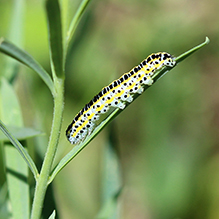 |
Another moth and its larva (on common toadflax) from Carlton County: Calophasia lunula. |
Alfredo Colon |
||
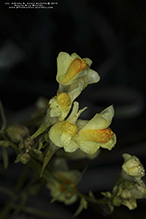 |
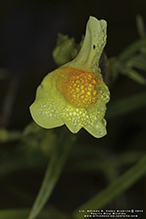 |
|
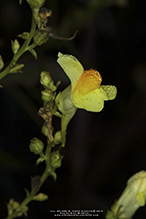 |
||
MinnesotaSeasons.com Photos
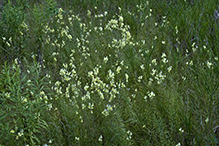 |
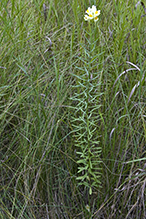 |
|
Habitat |
||
|
||
|
||
|
Plant |
|
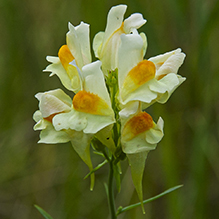 |
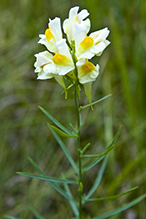 |
|
Inflorescence |
Inflorescence |
|
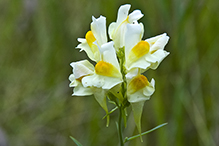 |
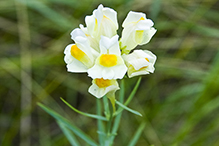 |
|
Inflorescence |
Inflorescence |
|
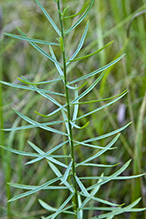 |
||
Leaves |
|

Slideshows
Toadflax
DianesDigitals
Linaria vulgaris (Butter-and-eggs)
Allen Chartier

Visitor Videos
Share your video of this plant.
This button not working for you?
Simply email us at info@MinnesotaSeasons.com.
Attach a video, a YouTube link, or a cloud storage link.
Other Videos
Environmental Laboratory - U.S. Army Corps of Engineers
EnvLabERDC
Vlasbekje - Linaria vulgaris - Common Toadflax
dreamshot
Common Toadflax (Linaria Vulgaris) - 2012-09-16
W3stlander

Visitor Sightings
Report a sighting of this Plant.
This button not working for you?
Simply email us at info@MinnesotaSeasons.com.
Be sure to include a location.
Gary Walton
6/17/2024

